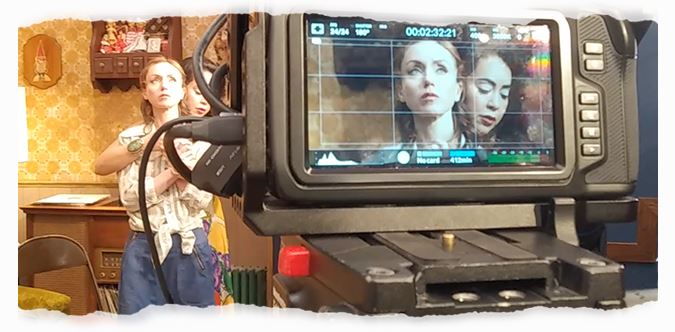How to act in a movie – A Comprehensive Guide
Want to know how to act in a movie? Let’s explore the fundamentals of “how to act in a movie”. Here is a complete guide. Just have a look!
Have you ever dreamt of seeing your name on the silver screen? Do you yearn to bring characters to life and captivate audiences with your emotional depth and captivating presence? If so, welcome aspiring actors to the exciting world of acting! This journey may seem daunting initially, but you can transform your dreams into reality with dedication, passion, and guidance. Let’s explore how to act in a movie.
In this comprehensive guide, we’ll dig into the captivating world of acting, equipping you with the essential tools and knowledge to navigate your path to success. From understanding the fundamentals of acting to mastering various techniques and navigating the industry, we’ll be your companion on this thrilling adventure.
Table of Contents
How to act in a movie?
Ready to take the first step on your acting journey? Let’s explore the fundamentals of movie acting!
Continue reading to discover:
- What makes acting for film unique?
- Essential acting techniques to master
- How to prepare for a movie audition?
- Navigating the film industry and finding opportunities
- Tips and tricks from seasoned actors
So, are you ready to embark on this transformative journey? Buckle up because the curtain is about to rise on your acting career!
Read More: 13 Popular Types of Acting Methods – Comprehensive Guide
1st Fundamental: What Makes Acting for Film Unique?
How to act in a movie? Movie or film acting demands unique skills and approaches compared to acting mediums like stage or television. It’s a delicate craft that requires actors to master tones and subtleties to captivate audiences through the lens of a camera. Let’s understand a few points:
Point 1. A Window into Your Soul
Unlike on stage, where actors project emotions for a large audience, film performances exist within the intimate space of the screen. The camera’s ability to capture the slightest flicker of emotion, the subtle tremor of a voice, or the unspoken stories in your eyes demands incredible authenticity and depth.
Point 2. The Power of Subtlety
Though effective on stage, grand gestures and exaggerated facial expressions can appear dramatic and unnatural on film. Film acting requires a focus on internalizing emotions and conveying them through subtle shifts in expression, micro-expressions, and the subtle modulation of your voice.
Point 3. A Dance with the Camera
Film acting is a collaborative art form, and your movements on screen must perfectly harmonize with the camera’s movements. Understanding blocking, the planned move of actors within the frame is crucial to ensure your performance is captured effectively.
Point 4. The Power of Silence
Unlike the fast-paced nature of stage productions, film acting often incorporates moments of silence and stillness to allow the audience to immerse themselves in the character’s emotions and the story’s atmosphere. Mastering the art of silent acting will enable you to convey powerful emotions without uttering a single word.
Point 5. Adaptability and Creativeness
The film set is a dynamic environment, and actors often need to adapt to changes in script, scene, or direction on the fly. Thinking on your feet, adapting to unexpected situations, and incorporating improvisational elements into your performance are valuable skills in film acting.
Mastering the Art of Acting for Film
Now that we’ve explored the unique aspects of film acting let’s dig deeper into the essential techniques you can master to bring your characters to life on the silver screen. In the next chapter, we’ll be your guide to:
- Emotional recall and sense memory. Powerful tools to tap into genuine emotions.
- Character development and analysis. Understanding your character’s motivations and background.
- Script analysis and scene breakdown. Uncovering the hidden depths of your scenes.
- Voice and speech techniques. Mastering vocal projection and inflection.
- Physical acting and movement. Using your body to tell the story.
So, are you ready to unlock your inner movie star and embark on this exciting journey? Stay tuned for the next chapter, where we’ll equip you with the essential tools and techniques to master the art of film acting!
Read More: How to Act – 12 Effective Tips
2nd Fundamental: Essential Acting Techniques for Film
As you embark on your journey to becoming a captivating film actor, mastering essential techniques will be your foundation for success. These tools will enhance your performance and equip you with the confidence and flexibility to navigate the dynamic world of film. Let’s recall some points to understand better:
Point 1. Emotional Recall and Sense Memory
The ability to evoke genuine emotions on screen sets captivating actors apart. Emotional recall allows you to tap into past experiences and memories to connect with the character’s emotional state. On the other hand, sense memory harnesses the power of sensory details like sight, smell, and sound to trigger authentic emotional responses. By mastering these techniques, you can portray a wide range of emotions with depth and authenticity.
Point 2. Character Development and Analysis
No character exists in a vacuum. To embody your character fully, you need to understand their motivations, desires, fears, and weaknesses. This involves meticulously analyzing the script, researching, and creating a detailed backstory for your character. By understanding their journey, you can make informed choices about their behavior, reactions, and emotional responses, resulting in a nuanced and believable portrayal.
Point 3. Script Analysis and Scene Breakdown
The script is more than words on a page; it’s a roadmap to the story and your character’s emotional arc. Script analysis involves understanding the theme, identifying key plot points, and recognizing your character’s emotional journey. Scene breakdown, on the other hand, delves deeper into each scene, dissecting its purpose, the subtext, and the relationship dynamics at play. By deciphering the director’s vision through script analysis, you can create a performance that aligns with their artistic vision.
Read More: VISUAL STORYTELLING TECHNIQUES IN FILM
Point 4. Mastering the Art of Vocal Expression
Your voice is a powerful tool that can convey many emotions and intentions. Mastering voice and speech techniques involves learning to project your voice clearly, modulate your vocal inflection, and use silence effectively. Understanding and incorporating different accents and dialects can add depth and authenticity to your performance. By mastering these techniques, you can ensure your character’s voice resonates with the audience and contributes to the film’s overall impact.
Point 5. Physical Acting and Movement
Film acting isn’t just about words; it’s about using your entire body to communicate emotions and intentions. Physical acting involves mastering body language, movement, and gestures to convey your character’s internal state and tell the story without relying solely on dialogue. This requires practice, awareness of your body, and the ability to express emotions through physicality. Incorporating physical acting into your performances allows you to add depth and complexity that transcends words.
Point 6. Collaboration and Communication
Film acting is a collaborative art form. You’ll work with a director, other actors, and crew members to bring the story to life. Effective communication and collaboration are essential for creating a cohesive and impactful performance. Listen actively to the director’s feedback, be open to suggestions, and work with your fellow actors to create believable relationships on screen. Collaborating effectively can contribute to a unified and impactful film production.
Point 7. Learning from the World Around You
Great actors are keen observers of the world around them. Please consider how people behave, interact, and express themselves differently. This observation will provide rich inspiration and reference points when building your character. Developing empathy allows you to connect with characters different from yourself and portray them with depth and understanding. Observing and empathizing will enable you to expand your acting range and create relatable and engaging characters.
Point 8. Overcoming Challenges and Staying Motivated
The journey to becoming a successful film actor is paved with challenges and setbacks. Rejection, self-doubt, and competition are all part of the process. However, staying motivated and persevering through these obstacles is crucial for success. Remember, the most successful actors are those who are resilient, learn from their mistakes, and never give up on their dreams. By staying motivated and overcoming challenges, you can achieve your goals and carve your path in the film industry.
Read More: Acting Tips To Become An Actor (2024) -Acting Excellent
Putting Your Skills into Practice
Now that you have the essential film acting techniques, it’s time to put them into practice. In the next chapter, we’ll explore:
- Auditioning and landing your first movie role
- Navigating the film industry and finding opportunities
- Building a successful acting career
Remember, the journey to becoming a successful film actor is paved with hard work, dedication, and a passion for the craft. Keep honing your skills, embrace learning opportunities, and always keep sight of your dream.
3rd Fundamental: How to Prepare for a Movie Audition
Preparing for a movie audition requires meticulous planning, focused practice, and confident execution. Following these steps can increase your chances of landing your dream role and impress the casting directors. Let’s explore further:
Point 1. Research and Understand the Project
- Read the script. Immerse yourself in the story, understand the overall tone, and grasp the essence of your character.
- Research the director and casting team. Please familiarize yourself with their past work and artistic vision to tailor your performance accordingly.
- Learn about the production. Understand the film’s budget, genre, and intended audience.
Point 2. Deep Dive into Your Character
- Analyze the character breakdown. Understand the character’s personality, motivations, desires, fears, and background story.
- Create a character book. Develop a comprehensive profile of your character, including their physical appearance, mannerisms, speech patterns, and emotional triggers.
- Practice with different approaches. Explore various character interpretations to find the most compelling and fitting portrayal.
Point 3. Master the Scene and Lines
- Memorize your lines flawlessly. Internalize your dialogue to deliver it naturally and convincingly.
- Rehearse the scene repeatedly. Practice the location out loud, alone and with a partner, to ensure smooth delivery and natural reactions.
- Mark the scene. Identify critical moments, emotional shifts, and pauses to create a dynamic and engaging performance.
Point 4. Choose the Right Outfit and Presentation
- Dress professionally and appropriately. Choose clothing that reflects your character’s personality and the film’s overall tone.
- Maintain a confident and positive demeanor. Project an aura of enthusiasm and professionalism from the moment you arrive.
- Arrive early and be prepared. Familiarize yourself with the audition venue and have all necessary materials readily available.
Read More: 34 rules for makeup to look younger after and before
Point 5. Be Present and Authentic in the Moment
- Listen actively to the casting directors. Please pay close attention to their feedback and adjust your performance accordingly.
- Embrace spontaneity and improvisation. Be prepared to react to unexpected prompts and changes in the scene.
- Focus on the emotional connection. Connect with your character and let the emotions drive your actions and reactions.
Point 6. Follow Up and Express Gratitude
- Thank the casting directors for their time and consideration. Send a personalized email expressing your appreciation for the opportunity.
- Stay positive and motivated. Regardless of the outcome, maintain a positive attitude and focus on your next opportunity.
Additional Tips on How to Act
- Record your rehearsals: Watch your rehearsals to identify areas for improvement and refine your performance.
- Seek feedback from acting coaches or fellow actors: Gain valuable insights and constructive criticism to enhance your performance.
- Stay calm and focused: Manage your nerves and perform confidently and clearly.
Following these steps and consistently practicing your craft will enable you to tackle any audition and impress the casting directors. Remember, preparation is critical, but so is staying true to yourself and letting your passion for acting shine through.
Read More: Top 10 best acting tips for beginners
4th Fundamental: Finding Opportunities in the Film Industry
The film industry is vast and intricate; navigating its pathways to find acting opportunities can feel daunting. But with the right strategies and dedication, you can carve your path and build a successful career. Let’s understand some points:
Point 1. Build Your Network
- Attend industry events. Networking events, workshops, and film festivals provide valuable opportunities to connect with casting directors, producers, and other actors.
- Join online communities. Participate in online forums and groups dedicated to actors and filmmakers to connect with like-minded individuals and share resources.
- Reach out to professionals. Feel free to connect with industry professionals directly through personalized emails or social media messages.
Point 2. Develop a Strong Online Presence
- Create a professional website. Showcase your acting resume, headshots, and video clips to highlight your talent and experience.
- Utilize online casting platforms. Websites like Backstage, Actors Access, and Casting Networks offer many audition opportunities for actors of all levels.
- Build a solid social media presence. Engage with industry professionals and followers online, sharing your work and building your reputation.
Point 3. Seek Representation
- Consider getting an agent or manager. A good agent or manager can help you connect with casting directors, negotiate contracts, and manage your career progression.
- Research different agencies and managers. Find representatives who specialize in representing actors in your genre and experience level.
- Build a strong relationship with your representative. Communicate regularly, keep them updated on your work, and trust their guidance.
Point 4. Continuously Hone Your Skills
- Invest in acting classes and workshops. Seek opportunities to learn from experienced actors and coaches to refine your craft.
- Participate in local theatre productions. Gain valuable experience performing live in front of audiences.
- Watch films and study great actors. Analyze their performances and techniques to learn and incorporate elements into your work.
Point 5. Be Proactive and Persistent
- Market yourself actively. Submit your materials to casting calls, contact filmmakers directly, and attend workshops and events.
- Embrace rejection and learn from it. Don’t let setbacks discourage you; use them to improve your skills and refine your approach.
- Stay motivated and focused. Remember your passion for acting and remain persistent in pursuing your goals.
Additional Resources
- Film Commissions: Many states and cities offer resources and support for actors and filmmakers.
- Professional Organizations: Organizations like SAG-AFTRA and the Actors Equity Association provide valuable resources and support for professional actors.
- Industry Publications: Read industry magazines and websites like Variety, Deadline, and The Hollywood Reporter to stay informed about industry news and upcoming opportunities.
Remember, success in the film industry requires a combination of talent, hard work, and perseverance. By building your network, developing your skills, and persistently seeking opportunities, you can navigate the industry’s complexities and achieve your acting goals.
5th Fundamental: Tips and Tricks from Seasoned Actors
As you embark on your journey to captivate audiences on screen, the wisdom of seasoned actors can illuminate your path and provide valuable insights into the world of film acting. Here are some of the gems they have shared:
1st Gem. Embrace the Power of Observation
- “The best actors are the best observers of human behavior.” – Marlon Brando.
- “Pay attention to the little things, the things that most people wouldn’t even notice. Those are often the details that make your character come alive.” – Meryl Streep.
2nd Gem. Find Inspiration Everywhere
- “Everything you see, hear, and feel can be used as inspiration for your characters,” said Robert De Niro.
- “Don’t limit yourself to just watching movies for inspiration. Read books, listen to music, watch documentaries – anything that can spark your imagination and help you connect with your character’s emotions.” – Daniel Day-Lewis.
3rd Gem. Trust Your Intuition
- “The best performances come from a place of truth and authenticity. Don’t be afraid to trust your instincts and let the emotions flow.” – Frances McDormand.
- “The key to acting is not to think, but to feel. Don’t analyze your character too much. Just let yourself be in the moment and react authentically.” – Jack Nicholson.
4th Gem. Embrace the Challenge
- “It’s okay to be scared or nervous. That means you’re pushing yourself and trying something new. The most rewarding performances often come from the most challenging roles.” – Emma Thompson.
- “Always be willing to learn and grow. Every experience, good or bad, can help you become a better actor.” – Denzel Washington.
5th Gem. Never Give Up
- “The most important thing is to never give up on your dreams. No matter how many times you get rejected, keep believing in yourself and keep working hard.” – Viola Davis
- “There will be times when you doubt yourself, but don’t let that stop you. Remember why you started this journey and keep your passion alive,” said Leonardo DiCaprio.
Bonus Tips
- Be flexible and adaptable. Be prepared to adjust your performance to the director’s vision and collaborate effectively with your fellow actors.
- Take care of your physical and mental health. Your well-being is crucial for delivering your best performance.
- Never stop learning and growing. Attend workshops, read books, and watch films to expand your knowledge and skills.
- Enjoy the process! Acting is a challenging but rewarding career. Embrace the journey and have fun with it.
By incorporating these valuable insights from seasoned actors, you can equip yourself with the tools and mindset necessary to navigate the film industry and leave a lasting impact on audiences through your captivating performances. Remember, becoming a successful actor requires dedication, perseverance, and a passion for the craft. Keep learning, growing, and believing in yourself; you will achieve your dreams.
How to Act in a Movie? The Bottom Lines
From the thrill of the audition to the magic of capturing emotions on screen, acting in a movie is a journey filled with challenges and rewards. By embracing the unique aspects of film acting, mastering essential techniques, and navigating the industry with dedication and passion, you can unlock your inner movie star and captivate audiences with your talent.
Read More: Acting Tips for film: Every Actor Needs to Know
This article has equipped you with the fundamental knowledge and valuable insights to embark on your acting journey. But remember, this is just the beginning. The journey to success in the film industry requires relentless effort, continuous learning, and unwavering belief in your potential.
So, are you ready to take the first step toward your dream? What are you waiting for? Sharpen your skills, pursue opportunities, and always remember your passion. The world awaits your captivating performances – take the stage and let the magic of film acting unfold!
What are your thoughts on acting in movies? Do you have any questions or experiences you’d like to share regarding how to act in a movie? Leave a comment below, and let’s start a conversation!








One Comment